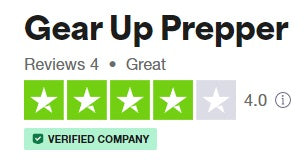The First Responder Prepper: Emergency First Aid for Survivalists
In a world where natural disasters, pandemics, and unforeseen emergencies seem to be on the rise, the term "prepper" has gained significant attention. Preppers are individuals who take proactive steps to prepare for any crisis that might come their way, from stockpiling food and water to creating secure shelters. However, one aspect that is often overlooked but equally crucial is emergency first aid for survivalists. In this article, we will delve into the importance of being a first responder prepper and provide insights into essential emergency first aid skills.
Why First Aid Matters for Survivalists
Survivalists understand the importance of self-reliance and being prepared for the worst-case scenario. In any emergency situation, whether it's a natural disaster, a power outage, or a medical emergency, access to professional medical care might be delayed or unavailable. In such cases, being a first responder prepper can make a significant difference between life and death.
Building Your First Aid Kit
Every first responder prepper should start with a well-equipped first aid kit. Here are some essential items to include:
- Sterile bandages and dressings: Various sizes and types for wound care.
- Antiseptic wipes: For cleaning wounds and preventing infection.
- Scissors, tweezers, and forceps: Essential tools for various medical procedures.
- CPR mask: To perform CPR safely.
- Adhesive tape and wraps: For securing bandages and splints.
- Pain relievers: Over-the-counter pain medications like ibuprofen or acetaminophen.
- Antihistamines: Useful for allergies and allergic reactions.
- Disposable gloves: To maintain hygiene during medical procedures.
- Thermometer: To monitor body temperature.
- Emergency blanket: For maintaining body warmth.
- Tourniquet: In case of severe bleeding that cannot be controlled by direct pressure.
- Instant cold packs: For reducing swelling and pain.
-
Emergency medications: If you or family members have specific medical conditions or allergies, ensure you have necessary prescription medications and EpiPens.
Essential First Aid Skills
- CPR (Cardiopulmonary Resuscitation): Knowing how to perform CPR can save a life in cardiac arrest situations. Consider taking a CPR course to become certified.
- Basic wound care: Understanding how to clean and dress wounds to prevent infection is crucial. You should also know when to seek professional medical help for more severe injuries.
- Fracture management: Learning how to immobilize and splint fractures can prevent further damage.
- Burn treatment: Knowing how to treat burns and scalds can alleviate pain and reduce complications.
- Hemorrhage control: In cases of severe bleeding, mastering techniques like tourniquet application and pressure dressings can be lifesaving.
- Managing shock: Recognizing and managing shock symptoms is essential for stabilizing an injured person.
-
First aid for common medical conditions: If you or your family members have preexisting medical conditions, learn how to manage them effectively in emergency situations.
Staying Informed and Practicing Regularly
Skills can deteriorate over time, so it's crucial to stay informed and practice regularly. Consider participating in first aid workshops, attending refresher courses, and joining prepping communities where you can exchange knowledge and experiences with like-minded individuals.
Creating an Emergency Medical Plan
In addition to your first aid skills and supplies, having an emergency medical plan is vital. Here are some key components:
- Contact information: Keep a list of emergency contacts, including local healthcare providers, hospitals, and poison control centers.
- Designate roles: Within your prepping group or family, designate someone as the primary first aid provider. Ensure everyone knows their responsibilities during an emergency.
- Regular drills: Practice your emergency medical plan through mock scenarios to ensure everyone is familiar with their roles and responsibilities.
-
Communication: Establish a reliable method of communication during emergencies, especially if you get separated from your group.
Conclusion
Being a first responder prepper is not just about stockpiling supplies; it's about having the knowledge and skills to provide immediate medical assistance when it matters most. In a crisis, you may be your family's or community's first line of defense. By building a comprehensive first aid kit, acquiring essential skills, and developing a well-thought-out emergency medical plan, you can truly embody the role of the first responder prepper and contribute to the safety and well-being of those around you during challenging times. Remember, preparedness today ensures a safer tomorrow.






